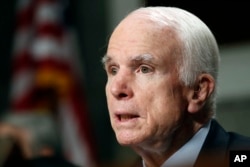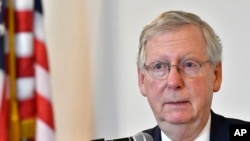U.S. President Donald Trump pointedly pushed the Republican-controlled Congress Monday to overhaul the U.S. health care law championed by former President Barack Obama before it leaves on its annual August vacation, but lawmakers have not agreed on how to repeal and replace it.
"I cannot imagine that Congress would dare to leave Washington without a beautiful new HealthCare bill fully approved and ready to go!" Trump said in a Twitter comment.
He said that before he became president he listened to Republican calls to dump Obama's law, commonly known as Obamacare. "Now they finally have their chance!" he said.
But divisions remain among Republican lawmakers about the details of any replacement package, leaving the repeal effort in doubt as national surveys show little support for the Republican proposals.
The majority Republican caucus in the Senate is meeting Tuesday to try to reach a consensus. Some senators want to eliminate as much as possible of Obama's signature law, while others are looking to preserve popular parts of it, including insurance funding for poorer Americans.
On Monday afternoon, more than 80 demonstrators were arrested in the Capitol while protesting Republican efforts to repeal and replace Obamacare. The protesters split into small groups and scattered throughout the House and Senate office buildings targeting specific lawmakers, some of whom are seen as swing votes. Capital police say they responded to 13 locations in the Capitol and warned the protesters to stop their "unlawful demonstration activities," before arresting those who did not.
Republicans have campaigned for seven years to overturn the 2010 law, approved then without a single Republican vote. But even with Republicans controlling the White House and both houses of Congress, the party's lawmakers have so far been unable to agree on how to change it.
On Sunday, one key lawmaker, Senator John McCain, cast doubt on the Republican prosopals, telling CBS, "My view is that it's probably going to be dead."
White House chief of staff Reince Priebus told Fox News on Sunday, "The president expects them to get this done. The president expects the Senate to fulfill the promises it made to the American people."
The House of Representatives narrowly approved a proposal in May. Trump initially cheered the passage of that bill at a White House rally, but since has called it "mean" and lobbied the Senate to approve an overhaul with "heart." Key Trump administration officials have been lobbying lawmakers who have been holding out against the revamp.
Republicans have a 52-48 majority in the Senate, giving them little room for dissenters to oppose the overhaul, since all Democrats say they will vote against it. If the vote ends in a 50-50 tie, Vice President Mike Pence is set to cast the deciding vote in favor.
But several Republican lawmakers have increasingly voiced doubts about their party's proposals, with some worried it could cut health care insurance for millions of people, especially narrowing coverage under the government's health care program for poorer Americans known as Medicaid. Others are worried that the proposed overhaul could curb health insurance coverage for patients with pre-existing medical conditions.
One independent assessment of the Senate plan, by the Congressional Budget Office, said 22 million people would lose insurance to help pay their medical bills during the next decade, compared to coverage under Obamacare. The CBO is assessing several other Republican proposals to determine how they might affect the number of people covered and how much they would have to pay for insurance in the coming years.
Senate Majority Leader Mitch McConnell said last week that if his party is unable to pass repeal legislation, then Republicans would have to join Democrats in revamping Obamacare to shore up faltering insurance coverage in some states, a bipartisan effort they so far have been unwilling to undertake. Some arch-conservative lawmakers favor repealing the whole law, without immediately adopting a replacement plan.
No vote on the Republican effort is expected this week, but could occur next week as Congress moves toward the August recess.


